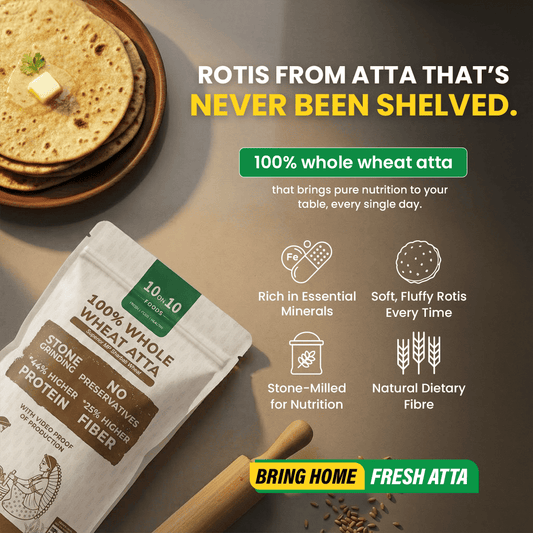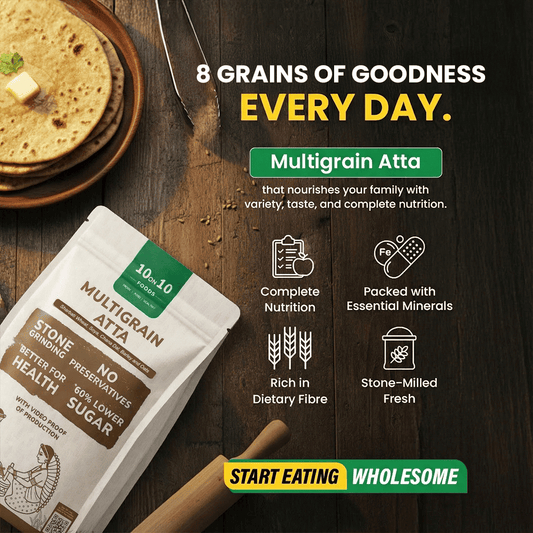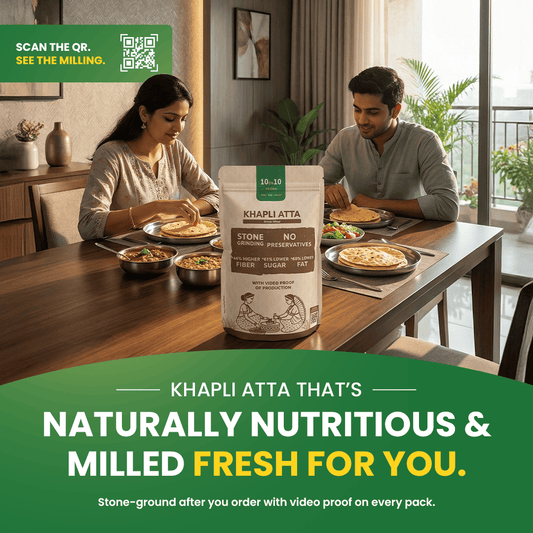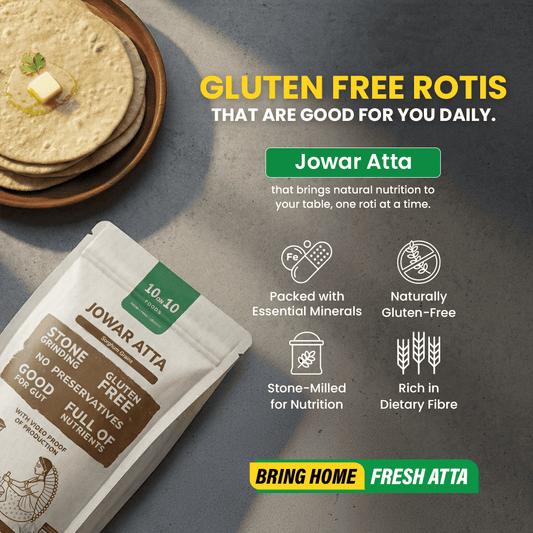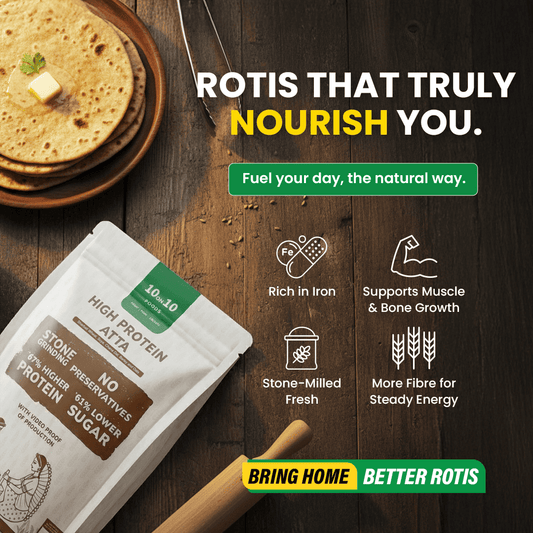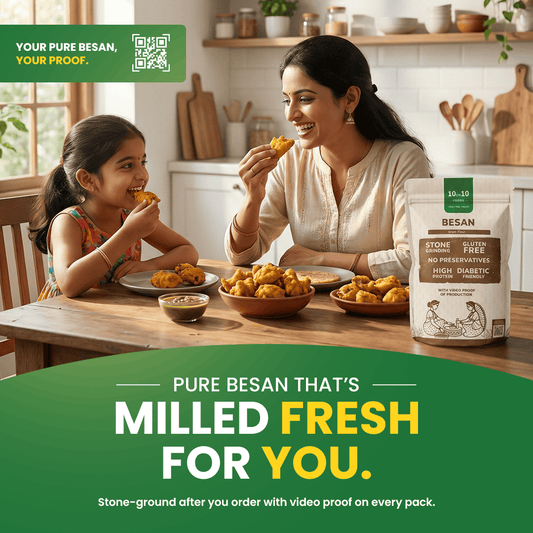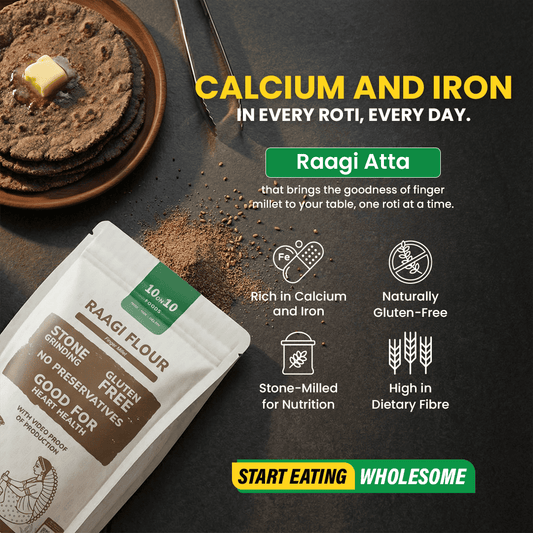
Best Flour to Include in Your Diet for Winters: Why Khapli & Jowar Win
MOORAV FOODTECH PRIVATE LIMITED AdminShare
Have you ever noticed there’s something magical about winters in India - the misty mornings, the smell of fresh ghee on parathas, and the comfort of warm rotis straight off the tawa. But as cozy as the season feels, our bodies quietly start demanding more - more warmth, more care, more nourishment.
And that’s exactly why what goes into your everyday flour matters the most.
Most of us think of atta as a basic ingredient, a necessity, not a choice and even not a priority . But the truth is that the flour you eat every day could be the difference between simply surviving the season and thriving through it. This winter, it’s time to go beyond the usual wheat and discover two ancient grains that truly understand your body’s winter needs. Yes we are talking about - Khapli and Jowar.
Why Your Body Needs the Right Flour in Winters
When the temperature drops, your body naturally slows down its metabolism to conserve energy and heat. This means you burn calories more slowly and crave heavier meals. But the trick is not to eat more, but to eat better.
Your winter diet should be rich in complex carbohydrates, proteins, fiber and essential minerals, the kind that give you energy throughout the day, support immunity and keep your body warm from the inside out.
This is where traditional cereals such as Khapli and Jowar stand. They're not just old school - they're scientifically better suited to how our bodies work in cold weather.
Unlike refined flour, which loses most of its nutrients during processing, these grains are naturally rich in protein, fiber and micronutrients. They release energy slowly, balance sugar levels and keep you full for longer perfect for the slower rhythm of winter.
What is Khapli Wheat?
Khapli, or Emmer Wheat, is one of the world’s traditional grains, a close ancestor of modern wheat, packed with protein, fiber, and antioxidants.
Why Khapli Flour Wins in Winter
Khapli is a winter must to have for one big reason. it nourishes deeply but also digests easily. Its low gluten content makes it gentle on the gut, while its high fiber ensures smooth digestion (yes a common winter pain).
It’s rich in vitamin B-complex, which supports metabolism and keeps your body temperature balanced, and magnesium and zinc, which strengthen immunity against seasonal infections.
What’s also fascinating is Khapli’s low glycemic index it keeps your energy steady, preventing those post-meal dips that make you reach for an extra cup of chai.
And the best part? Khapli rotis have a warm, nutty flavor that pairs beautifully with all those winter meals like - saag, ghee, and homemade pickles. It’s comfort food with purpose.
What is Jowar?
Jowar, which is also known as Sorghum, is a naturally gluten-free millet known for its fiber density, iron richness, and powerful antioxidants.
Why Jowar Flour Deserves a Place on Your Plate
Tides are like that quiet, understated friend who, once you get to know them, turn into a powerhouse.It is rich in iron, calcium and phosphorus, which strengthen bones also especially useful when joints become stiff in cold weather. Its high antioxidant levels help reduce inflammation and protect against oxidative stress, keeping energy up even on the haziest of mornings.
The soluble fiber in jowar not only aids digestion but also keeps cholesterol under control – great for heart health, which often lags behind when it comes to comfort eating in winters.
And because it's gluten-free and alkaline in nature, it's easy on the system perfect for anyone who wants to feel active and balanced, not sluggish and heavy.
Pair warm jowar roti with a bowl of dal or sabzi and you will feel the difference – steady energy, warmth and satisfaction without post-meal fatigue.
Why Freshly Milled Flour Changes Everything
Now, let’s talk about a point where most people miss the real deal.
Even if you pick the best grain, if your flour has been sitting on a supermarket shelf for weeks, it’s already lost a main part of its natural goodness. The oils in grains begin to oxidise as soon as they’re milled, meaning that by the time packaged flour reaches your kitchen, most of the fiber, vitamins, and essential minerals are just gone.
That’s why 10on10 Foods does things differently.
At 10on10 food, we believe food shouldn’t have an expiry date — it should have a life.
Our flour is stone-milled only after you place your order, ensuring every bite still carries the freshness, aroma, and nutrients of the original grain.
There are no preservatives, no additives, no shortcuts just pure, freshly milled atta the way nature intended.
To build that real trust, we even provide video proof of our milling process, complete with timestamps, so you can see exactly when your flour was made.
And to care for the planet as much as we care for your health, we pack everything in eco-friendly, refillable packaging that reduces waste.
It’s simple, honest, and transparent because food should never be a mystery.
The 10on10 Way: Bringing Warmth and Wholesomeness Together
Winters are a reminder to slow down, to connect again, with ourselves, our food, and our roots.
Khapli and Jowar aren’t modern superfoods, they’re the wisdom of our grandparents brought back to our kitchens.
And when they’re milled fresh, without chemicals or long processing, they become more than just a food. they become medicine for the season.
With 10on10 Foods, you get the true essence of these grains their natural oils, rich fiber, and authentic taste, delivered within hours of milling.
So this winter, skip your basic usual routine and choose what truly fuels you. Let your rotis not just fill you up but warm you from within. Go for grains that respect your body again like - Khapli for strength, Jowar for balance, and 10on10 Foods for honesty.
Because when food is fresh, natural, and full of life, your body doesn’t just eat it thrives.
Freshly milled. Naturally nutritious. Perfect for winter. That’s 10on10.


